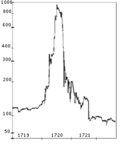Portal:Business
The Business and Economics Portal  Business is the practice of making one's living or making money by producing or buying and selling products (such as goods and services). It is also "any activity or enterprise entered into for profit." A business entity is not necessarily separate from the owner and the creditors can hold the owner liable for debts the business has acquired except for limited liability company. The taxation system for businesses is different from that of the corporates. A business structure does not allow for corporate tax rates. The proprietor is personally taxed on all income from the business. A distinction is made in law and public offices between the term business and a company (such as a corporation or cooperative). Colloquially, the terms are used interchangeably. (Full article...) Economics (/ˌɛkəˈnɒmɪks, ˌiːkə-/) is a social science that studies the production, distribution, and consumption of goods and services. Economics focuses on the behaviour and interactions of economic agents and how economies work. Microeconomics analyses what is viewed as basic elements within economies, including individual agents and markets, their interactions, and the outcomes of interactions. Individual agents may include, for example, households, firms, buyers, and sellers. Macroeconomics analyses economies as systems where production, distribution, consumption, savings, and investment expenditure interact; and the factors of production affecting them, such as: labour, capital, land, and enterprise, inflation, economic growth, and public policies that impact these elements. It also seeks to analyse and describe the global economy. (Full article...) Selected article The London Necropolis Company (LNC), formally the London Necropolis & National Mausoleum Company until 1927, was a cemetery operator established by Act of Parliament in 1852 in reaction to the crisis caused by the closure of London's graveyards in 1851. The LNC intended to establish a single cemetery large enough to accommodate all of London's future burials in perpetuity. The company's founders recognised that the recently invented technology of the railway provided the ability to conduct burials far from populated areas, mitigating concerns over public health risks from living near burial sites. Accordingly, the company bought a large tract of land in Brookwood, Surrey, around 25 miles (40 km) from London, and converted a portion of it into Brookwood Cemetery. A dedicated railway line, the London Necropolis Railway, linked the new cemetery to the city. Financial mismanagement and internal disputes led to delays in the project. By the time Brookwood Cemetery opened in late 1854, a number of other cemeteries had opened nearer to London or were in the process of opening. While some parishes in London did arrange for the LNC to handle the burials of their dead, many preferred to use nearer cemeteries. The LNC had anticipated handling between 10,000 and 50,000 burials per year, but the number never rose above 4,100 per year, and in its first 150 years of operations only 231,730 burials had been conducted. Buying the land for Brookwood Cemetery and building the cemetery and railway had been very expensive, and by the time the cemetery opened the LNC was already on the verge of bankruptcy. The LNC remained solvent by selling surplus parts of its land, but as the land had been chosen for its remoteness, sales were low. Selected image
Selected economyThe economy of Iraq is dominated by the oil sector. The IFAD has classified Iraq as an oil-rich upper middle income country. In 2025, the economy is estimated to be at $690 billion (GDP PPP). making it as the fifth largest economy in the Arab world, seventh largest in the Middle East and North Africa and world's 51st largest. It is one of the top five Arab countries with gold reserves and 30th globally. (Full article...) Selected quote"People of the same trade seldom meet together, even for merriment and diversion, but the conversation ends in a conspiracy against the public, or in some contrivance to raise prices. It is impossible indeed to prevent such meetings, by any law which either could be executed, or would be consistent with liberty and justice. But though the law cannot hinder people of the same trade from sometimes assembling together, it ought to do nothing to facilitate such assemblies; much less to render them necessary. A regulation which obliges all those of the same trade in a particular town to enter their names and places of abode in a public register, facilitates such assemblies. It connects individuals who might never otherwise be known to one another, and gives every man of the trade a direction where to find every other man of it. A regulation which enables those of the same trade to tax themselves in order to provide for their poor, their sick, their widows and orphans, by giving them a common interest to manage, renders such assemblies necessary. An incorporation not only renders them necessary, but makes the act of the majority binding upon the whole. In a free trade an effectual combination cannot be established but by the unanimous consent of every single trader, and it cannot last longer than every single trader continues of the same mind. The majority of a corporation can enact a bye-law with proper penalties, which will limit the competition more effectually and more durably than any voluntary combination whatever."
TopicsRelated WikiProjectsDid you know (auto-generated) -
On this day in business history
General imagesThe following are images from various business-related articles on Wikipedia.
More did you know
Business news
SubcategoriesRelated portals
Things you can doUrgent and important articles are bold
WikimediaThe following Wikimedia Foundation sister projects provide more on this subject:
SourcesDiscover Wikipedia using portals |
































